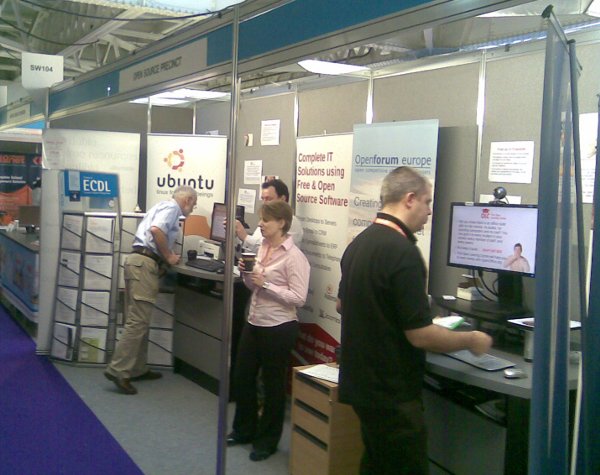Westminster eForum Speech
Today I had the pleasure of addressing the Westminster eForum event on Free and open source software in business, in government. I had a five minute slot following the excellent Karsten Gerloff of the Free Software Foundation Europe, then after speeches from Paul Holt, Andrew Katz and Christopher Roberts we had a panel Q&A with questions from the audience. Here are the notes from my speech, transcripts of the whole event will be distributed around Westminster. The seminar was sponsored by our friends at Sirius.
Hello & Good Morning Ladies & Gentleman.
My name is Alan Lord and I am co-owner of The Open Learning Centre; an Open Source Software Consulting and Services business based in Surrey.
In the few minutes I have I would like to briefly discuss a few of the themes that were suggested for this session.
So, starting with the first one then:
The challenges faced by small, medium and large organisations implementing Free & Open Source Software?
For me, one of the key challenges is Procurement:
Procurement practices have not kept pace with changing times. Existing policies and procedures often struggle with the idea of acquiring something that is â€freeâ€. In addition, in our Free Software marketplace, many suppliers do not have the budgets or resources to participate in lengthy tendering processes and, frankly, often have better and less costly opportunities to pursue elsewhere.
Another challenge is lack of familiarity and knowledge: There is still a significant proportion of the population who haven’t really heard of, or understand what Free & Open Source Software is, even though they may use it everyday. The Open Source community has made tremendous inroads and awareness is definitely increasing, but bear in mind, we are competing against companies with multi-billion dollar marketing budgets.
Now I’d like to move on to mention something about:The costs of deploying Free and Open Source software?
Firstly, it’s important to recognise that the â€free†in Free Software generally refers to freedom and not necessarily the price; although Open Source Software is frequently zero cost too. It should be recognised that implementing any software solution has costs, whether or not the software itself is freely available.
Time, of course, is not free; training, consulting and other professional services require people and knowledge, all of which have a cost whether they be internally or externally sourced. Although I feel fairly confident in saying that Open Source providers tend to charge comparatively less, I would recommend you use your experience to estimate and budget for the financial costs of the professional services you will need to acquire. Typically, the work required will be similar, in volume at least, for any given project whether Free or proprietary.
The financial benefits of Open Source really make an impact once you start using it: There are no ongoing licensing fees; you may copy and replicate what you have as many times as you wish. Product development, bug fixes and new features can generally be introduced at your discretion, and not that of your software vendor.
Another question that is often discussed is:
Is Open Source Software vulnerable?
Open Source Software is widely regarded as being inherently more secure than comparable proprietary software. Generally I would concur with this; particularly with regard to Operating Systems such as Linux and BSD. However, no software is ever infallible or 100% secure, so as an IT manager one must take all available precautions.
Many of the stories of Open Source vulnerabilities are, in the end, down to lack of skill or knowledge in setting up and maintaining these systems; this is just the same as with the proprietary alternatives. Again, skills and good education are the key to minimising these risks.
Free and Open Source Software is created in a very different way to legacy software. The ‘source code’, or instructions, are public; anyone can look at them. In a well managed Open Source project this visibility actually helps to improve the security of the end product. The benefit of this code-transparency was famously described by Eric S. Raymond, a well known Open Source author and advocate:
“Given enough eyeballs, all bugs are shallow.â€
And finally I’d like to touch upon the question:
Who is responsible if Open Source Software is compromised or malfunctions?
Well – to be blunt. You are.
But then how is this different to proprietary solutions? If you’ve ever read a License Agreement for proprietary software then I’m sure you will have noticed that they start by disclaiming all liabilities, warranties and risks. Here’s one sentence taken from a very famous proprietary software vendor’s license agreement:
“The entire risk arising out of use or performance of the OS Components AND ANY SUPPORT SERVICES remains with you.â€
If your chosen proprietary software is compromised or malfunctions what happens? Basically, you await the benevolence of the manufacturer, who is hopefully still in business and has a copy of the version of your product. With Free and Open Source Software, you will ALWAYS have a copy of the source code available.
A key feature of Open Source licensing, and something that is specifically NOT offered in the proprietary world, is the empowerment to improve and change it yourself. This doesn’t mean that you have to write the code though, there are lots of developers who will do that for a fair price.
Thank you.
2 Sore Feet, 200+ CDs, 400+ Teachers: BETT 2009
After having a bit of lay-in this morning (but not as long as I’d hoped for), I thought I should mention what we got up to at BETT last week.

Along with our friends at the OpenForum Europe and helpers from a few other Free Software or Open Source related organisations, we exhibited much of what it is best about FOSS to the international education community.

We had a couple of shiny new Samsung 2343BW widescreen monitors showing off Edubuntu/Ubuntu to full effect. There were a variety of sub-notebook class devices demonstrating various Free OSs and just what £99 can get you if you care to look.
We discussed – sometimes at great length – philosophical, financial, technical, security and educational benefits that can be had from using FOSS solutions in an education context. (Why would anyone in their right mind use proprietary software if they had a choice or a clean sheet to start from?)
We promoted and extolled the virtues of many individual FOSS projects including, Moodle, Elgg, Mahara, Ubuntu, Edubuntu, and countless others.
We met up with colleagues old and new from various places such as: Elonex, Sirius and Alpha Plus. We found some new and interesting products. For me the most exciting was seeing first cross-platform interactive whiteboard solution being demonstrated on Windows, Mac OSX and Ubuntu live by Mimio.
As a comparison to last year, we made contact with nearly 200% more individuals, and gave away around 200 more Ubuntu Desktop CDs (and quite a few Server CDs too).
My personal take on this year’s BETT was pretty encouraging.
- I had many fewer conversations this year that started with me having to explain what FOSS is. And many schools and education authorities are familiar with and already using FOSS successfully.
- There was considerable interest in finding out more and in looking for ways to introduce FOSS into what is a very closed-shop (MS) environment currently.
- There was a really good throughput all week of teachers, ICT staff and Heads/Governors who expressed a passion for FOSS and its use in their schools and colleges.
- There was a great deal of criticism for the lack of leadership from Government regarding FOSS and the way in which the education sector is very largely tied to MS, especially with the SIMS product from Capita. This was a very frequent discussion; how to integrate non-Microsoft products such as OpenOffice.org with the almost ubiquitous Schools MIS platform.
- A healthy dose of scepticism from other visitors made us the educator for a while and hopefully we helped to open some eyes to the possibilities that FOSS can deliver.
- And I met a FAN! After looking at my business card and seeing our logo, the visitor I was talking too grabbed my hand, shook it passionately and declared with some gusto – “You are The Open Sourcerer!”. Fame at last eh. Thanks Phil, it was a pleasure to meet you.
Now the show is over, the stands are torn down, and everyone has left. This is when the real work starts. Following up with all those hundreds of educators who want our help to introduce FOSS into their environment.
My feet are still sore (and this is more than 24hrs after getting home) but it was bloody well worth it. I met some great people and feel as though we have achived a great deal more this year. All being well, next year’s BETT will be even bigger and bolder for us – the planning is already underway.
UK Government Finally Sanctions Open Source! [Updated]
The Inquirer has broken the news that the UK Government, helped by BECTA, has finally approved at least two companies to be official suppliers of Open Source Software into our Education sector.
OPEN SOURCE companies have been granted official permission to supply software to the UK public sector for the first time in British history.
At least two Open Source software suppliers have been awarded places on the £80 million Software for Educational Institutions Framework, making them official suppliers to UK schools and scoring a victory in what has been a long and frustrating battle against favouritism shown to conventional commercial software companies in UK politics and procurement.
One of the suppliers is Sirius IT run by Mark Taylor.
Mark, here’s many congratulations from us at The Open Learning Centre. You have been a fantastic advocate for OSS for many years and this award to supply is thoroughly deserved. We wish your company every success.
Novell are apparently another “named” party to the supplier framework and having been long-time sponsors of the OSS eco-system also deserve congratulations. Now, if only they’d drop the deal-with-the-devil…
Novell didn’t make it; Becta have just announced and released the list of the 12 suppliers. And as Glyn Moody also considers, the “pact with the Devil” in which Novell sold its identity to Microsoft probably means that it isn’t such a bad thing in reality. By way of support, the article I wrote just 6 weeks ago “How to remove Mono from Ubuntu…” was, and remains, the most read piece on the whole blog. And almost all of the 50+ comments are in support of the objective. Clearly there isn’t much appetite for tainited code in FLOSS from the enlightened…


